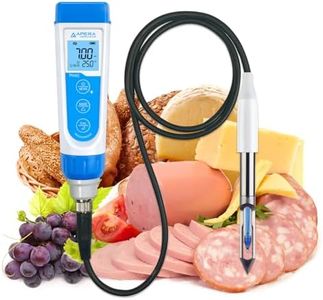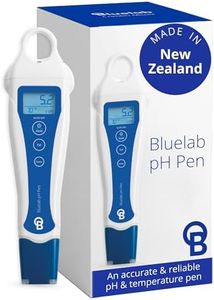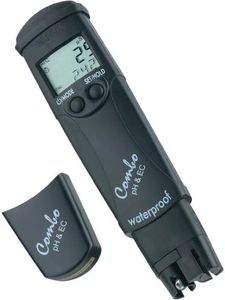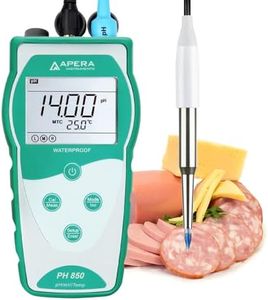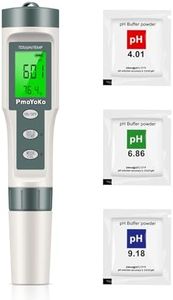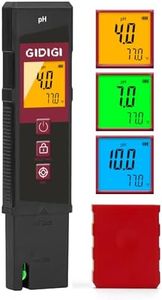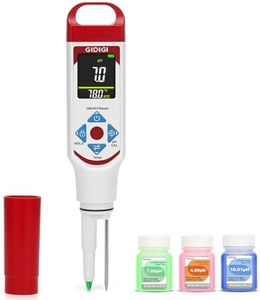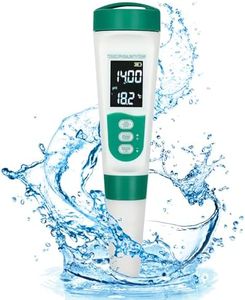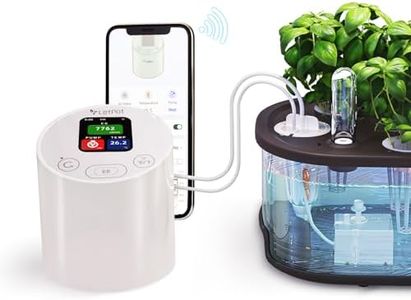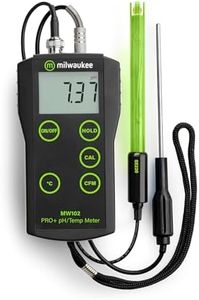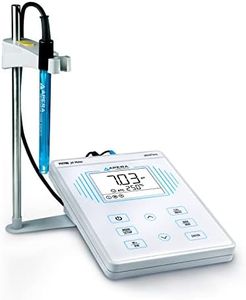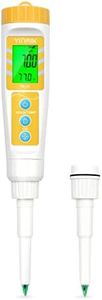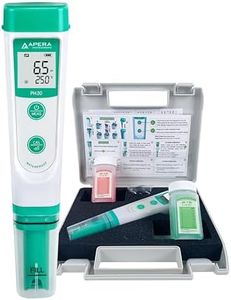10 Best pH Food Testers 2026 in the United States
Our technology thoroughly searches through the online shopping world, reviewing hundreds of sites. We then process and analyze this information, updating in real-time to bring you the latest top-rated products. This way, you always get the best and most current options available.

Our Top Picks
Winner
Apera Instruments Premium-Series PH60S Food pH Pocket Tester Kit, Swiss Spear pH Electrode, ±0.01 pH Accuracy, -2.00-16.00 pH Range (AI313)
Most important from
3423 reviews
The Apera Instruments Premium-Series PH60S Food pH Pocket Tester Kit is a versatile and accurate tool, ideal for measuring the pH of a variety of foods such as cheese, sushi rice, meat, and fruits. Its key strength is the Swiss spear sensor, providing high accuracy (±0.01 pH) and a broad range (-2.00 to 16.00 pH), which ensures reliable results for both solid and semi-solid food items. The long-life reference system and replaceable sensor add to its durability, making it a long-term investment for users who frequently need pH testing.
The tester's ease of use is enhanced by features such as automatic calibration, temperature compensation, and a large clear LCD with three backlit colors for different modes, which simplifies readings and indicates when results are stable and calibrations are complete. Additionally, a high/low value alarm function with a red backlight provides instant alerts for out-of-range results, adding an extra layer of usability and safety.
The kit is comprehensive, including calibration solutions, storage solutions, and even a portable carrying case, making it handy for both professional and home use. The product dimensions are compact (7 x 1.6 x 1.6 inches; 5.1 ounces), making it easy to handle and carry. While it is made in China, the quality and performance are on par with industry standards. This pH tester is particularly beneficial for culinary professionals, food safety inspectors, and home chefs who require precise pH measurements for food quality control.
Most important from
3423 reviews
Apera Instruments PH60-MT Handheld pH Meter Tester Kit with LabSen 765 pH/Temp. Blade Spear Electrode for Lab-Grade pH Measurement in Meats and Solid Food Samples
Most important from
3423 reviews
The Apera Instruments PH60-MT is designed for precise pH testing in meats and solid foods, making it a strong choice for professionals or serious home users needing lab-grade accuracy. Its standout feature is the LabSen 765 blade spear electrode, which uses Swiss sensor technology to prevent common issues like clogging in high-protein or fatty samples. This means you get fast and reliable readings without much fuss. The titanium body of the electrode adds durability, resisting corrosion and impacts—perfect for busy food processing environments where the device might get some rough handling.
The meter itself is user-friendly, with automatic calibration and temperature compensation, so you don’t have to manually adjust settings each time. It also has useful features like reading alarms and reading lock to help ensure precise results. Portability is another plus; the kit includes everything needed for testing on the go, including calibration buffers and an organizer to keep the process smooth. The response time is quick, which is helpful when testing multiple samples.
On the downside, while the device offers many advanced features, its price and professional-level capabilities might be more than casual users need. Also, keeping the electrode clean and properly maintained is important to maintain accuracy, which may require some attention over time. The PH60-MT is well-suited for anyone needing dependable and accurate pH measurements in solid foods, especially in professional or demanding settings, but might be more complex and costly for simple or occasional home use.
Most important from
3423 reviews
bluelab pH Pen - ± 0.1 pH Accurate, Durable Double Junction Probe, Waterproof & Floats, Auto Temperature Compensation, Easy Calibration - Made in NZ
Most important from
4916 reviews
The Bluelab pH Pen stands out as a versatile tool for maintaining optimal pH levels across various applications like hydroponics, pools, and aquariums. Its key strength lies in its impressive accuracy, offering readings with a precision of ± 0.1 pH, which is bolstered by a double-junction probe that minimizes contamination and extends the lifespan of the device. This makes it particularly useful for environments where precision is critical.
Ease of use is a priority in the Bluelab pH Pen's design. It features an easy two-point calibration process and provides a 30-day calibration reminder on its backlit LCD display, ensuring users can keep their measurements accurate with minimal hassle. The automatic temperature compensation feature also enhances its reliability, ensuring accurate readings even when environmental conditions change. Built for durability, the pH Pen is waterproof and designed to withstand harsh environments, even capable of floating if dropped into a solution. This robust construction makes it an excellent choice for both beginners and seasoned users who might operate in challenging conditions.
However, the product does have some limitations. While it excels in durability and accuracy, the need for regular calibration might be an inconvenience for some users. Additionally, the product's reliance on a single AAA battery, though included, could mean more frequent battery replacements if used extensively. The Bluelab pH Pen is well-suited for anyone who needs precise and reliable pH monitoring across various settings, particularly in hydroponics and gardening. Its high rating and popularity suggest it meets user expectations in performance and ease of use. Yet, potential buyers should be prepared for routine maintenance such as calibration and battery management to ensure continued accuracy.



